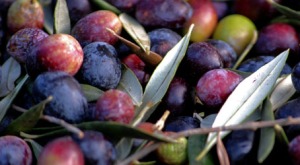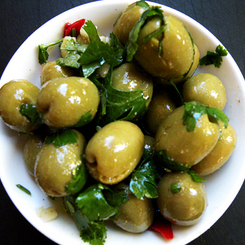
Olive Souk in Marrakesh, Morocco, Photo by Mary Mimouna
If you are an olive olive lover, you will find Morocco to be a paradise!
All the different colors and varieties of Moroccan olives are cured with different methods. The lemony greens, the succulent reds, and the pungent blacks are all done in several different ways, and each style has separate uses in the Moroccan cuisine.
Once the olives are picked off the trees in mid-November, they are usually cut in Morocco with a razor blade, using a long, diagonal slash. During the hand-cutting, they are sorted by color into green, red, and black, all going into different vats.
The olive vats are then filled with water, with the water being changed daily, until most of the bitterness is soaked out. This takes roughly two-to-three weeks, with each color taking a different amount of time.
The simplest home curing at this point involves just putting the olives into heavily-salted water. However, many people have their own family recipes, and olives in the souk are most often using other recipes involving both vinegar and heavily salted water. The olives are considered ready after three months, but can be eaten sooner. Many families in Morocco try to preserve one or two barrels at home to use throughout the year.
Only green and red olives tend to be used in cooked recipes in Morocco, and each type is used in different traditional recipes. Black olives are generally eaten as an accompaniment to salads, or arranged on top of the salad.
One interesting type of olive in the souk, which is also seen in restaurants, is a black variety which appears to be shriveled up, even spoiled. Don’t worry! Its shriveled appearance comes from the unusual way it is cured. Instead of being cut and soaked in salt water, it is picked off the tree and packed directly into salt, where it it left for about three months.
Moroccan spiced olives are another interesting variety of green olives. The cured green olives are cracked (pits left in) and mixed with chopped corriander and flat parsley, chili flakes or small whole chilies, finely chopped garlic, cumin powder, lemon juice, and a little olive oil. They are quite spicy, and often served before the meal in restaurants together with bread and butter.
While most often the pits are not removed, a few varieties do remove the pits and replace them with such delicacies as slivered almonds.
Whenever you visit the souks of Morocco, always take time to visit the olive markets, as the different olives on display provide a captivating photo opportunity. When eating in Moroccan restaurants, do take time to enjoy how and where the different colors and varieties of olives are served.
For more information about Moroccan Olives or a Private Morocco Tour of Cuisine and Curing Olives
For more information about Travel and Tours to Morocco plus highlights on Moroccan culture visit Morocco’s Imperial Cities, Seaside Resorts,Sahara Desert, Berber villages, A Taste of Morocco, Magical Kasbahs, Ruins & Waterfalls, Absolute Morocco, The Best of Marrakech, Fes, and Ouarzazate
Travel Exploration specializes in Morocco Travel. We provide Tours and travel opportunities to Morocco for the independent traveler and tailor-made tours for families and groups with a distinctly unique flavor. From Morocco’s Seven Imperial Cities, to the Magical Sahara Travel Exploration offers a captivating experience that will inspire you. At Travel Exploration we guarantee that you will discover the best of Morocco! Call Travel Exploration at 1 (800) 787-8806 or 1 (917)703-2078 and let’s book a tour to Morocco for you today.
Marrakech, Marrakesh, Marrakech Souks, Marrakesh Souks, Marrakech Travel, Marrakesh Travel, Moroccan Cuisine, Moroccan Meal, Moroccan Olivers, Morocco Land of Oliver, Moroccan Recipes, Moroccan Souks, Morocco Private Tours, Morocco Holidays, Morocco Travel, Travel Exploration, Travel to Morocco





